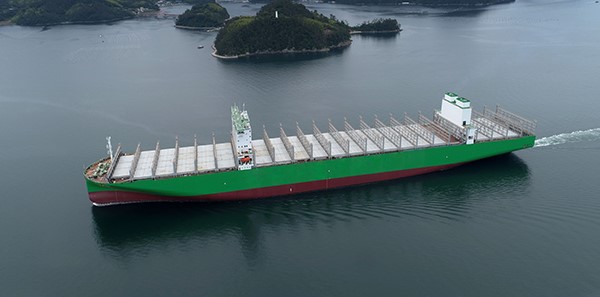Samsung Heavy Industries wins 16 methanol powered 16,000 TEU container ships contract worth 3.9 trillion KRW

Samsung Heavy Industries announced on the 17th that it had won an order for 16 methanol powered 16,000 TEU container ships from an Asian ship owner.
Samsung Heavy Industries has signed a large-scale eco-friendly shipbuilding contract worth nearly KRW 4 trillion. The company is getting closer to achieving its target for three consecutive years. On the verge of large-scale contracts such as LNG carriers and FLNG, a promising milestone in goal achievement for 3 consecutive years
The global ship market paying attention to 'methanol (CH3OH)' after LNG as an eco-friendly fuel.
The order amount is KRW 3,959.3 billion, the largest ever for a single shipbuilding contract. This broke the previous record (12 LNG carriers, KRW 3.331 trillion) set by Samsung Heavy Industries in June of last year. These vessels are scheduled to be delivered by December 2027.
With this contract, Samsung Heavy Industries has increased its order intake this year to a total of 25 ships, worth USD 6.3 billion and achieved 2/3 (66%) of its annual target of USD 9.5 billion at once. The order balance has grown to $33.6 billion, achieving the highest level in the past five years.
Order balance: USD 23 bn in 2019 → 22.2 bn in 2020 → 25.3 bn in 2021 → 29.5 bn in 2022
An official from Samsung Heavy Industries said, "Based on the solid order backlog, we will continue to prioritize profitability of vessels in contract acquisitions," and added, "If we win contracts for LNG carriers and FLNG projects, which are expected to be ordered in the second half, there won’t be any significant challenges in reaching our order goals for three consecutive years.”
Samsung Heavy Industries succeeded in expanding its alternative fuel vessels from LNG to methanol (CH3OH) through this contract and expects to further strengthen its competitiveness in the eco-friendly ship market in the future.
Moreover, methanol can reduce sulfur oxides emissions by 99%, nitrogen oxides by 80%, and carbon dioxide by more than 20%, compared to the traditional ship fuel, bunker C oil.
About captioned image: File picture of the vessel. Image source Samsung Heavy Industries Co's Media Source
